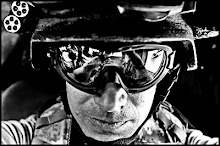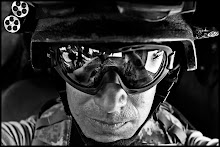“We’ve got a Bird two minutes out.” That’s the cue…two doctors hop onto a small motorized cart called a Gator, while the rest of the on-duty staff waits pensively in the ER. This is the 28th Combat Support Hospital, also known as Baghdad ER, a place where the horrors of war are evident on a daily basis. I grab my cameras, the required eye and hearing protection, and run at full clip out to the landing zone. Two Medevac helicopters, known as “birds,” land in formation, then the wounded soldiers are carried off and placed onto the Gators.

© zoriah/www.zoriah.com - blog use permitted, use credit, link to zoriah.com
Jogging back from the landing zone I see a group of armored vehicles pull up. A frantic group of soldiers drenched in blood tug a limp body out of the back of one of their vehicles; others crawl out holding open wounds. Inside the ER, there is an odd mix of organization and chaos. All of these doctors and medics are well accustomed to this ritual, perhaps hardened by it. But in their eyes it is obvious they are not jaded; they know they have a person’s life in their hands, someone with a mother, a father, friends and fellow soldiers, and that it is a life they must keep from slowly slipping away.

© zoriah/www.zoriah.com - blog use permitted, use credit, link to zoriah.com
In what seems like an instant, every bed in the ER is filled. Doctors are rushing from bed to bed, trying to stabilize individuals while they can barely suppress their kicking and seizures. The room is filled with a cacophony of voices talking of “brain matter,” “rocket Roger Clemens propelled grenades” and “IED’s.” “Whatever it was it got him right in the face,” says one doctor, as he inspects a young man’s wounds.

© zoriah/www.zoriah.com - blog use permitted, use credit, link to zoriah.com
The pace in the room is at a fever pitch. Doctors run back and forth grabbing surgical equipment and attempting to diagnose and stabilize the condition of each individual patient. The light is either glaringly bright or terribly dim as the doctors move in and out, leaning over the patients. There is barely enough room to move from the corner I am in and the floor is slippery with blood. Every time I raise a camera to my face I am conscious of the life support tubes, which dangle dangerously close to my body and equipment.
My biggest concern is not getting in the way of the doctors. I have a Public Affairs Officer (PAO) assigned to monitor my every move in the hospital, making sure I follow the guidelines and do not break the contract I have signed, one which forbids me from photographing soldiers faces, name plates or any other identifying feature such as tattoos and birth marks without having a release from the patient.

© zoriah/www.zoriah.com - blog use permitted, use credit, link to zoriah.com
The soldier with the head injury has been rushed across the hall for a CAT scan and I watch as the doctors analyze the data that is output onto their computer screens. The mood seems to be encouraging…until the screen refreshes. There is no hope, the damage is too severe. The doctors look crushed and I hear one say to another: “He has a ring…” The young soldier is married. One of the doctors walks into the hallway where thee young man’s platoon is sitting on the floor in blood soaked uniforms. The soldiers begin to cry and hug each other. Then they kneel to the ground and pray for their friend. Minutes later he succumbs to his wounds.
This was only my first three hours embedded in the 28th CSH…Baghdad ER. It is hard to imagine what one would experience during an 18-month tour here.
Photographs taken in Baghdad ER and Baghdad field hospitals.
© zoriah/www.zoriah.com - blog use permitted, use credit, link to zoriah.com
-
This story will be featured in its entirety on the following sites:
-
Color: www.warphotographer.org
Black and White: www.diariesofashooter.com



























